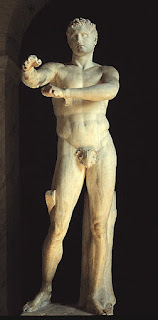Greek sculptures were among some of the first forms of art I studied in my art history classes. They began with anatomy that mirrored ancient Egyptian Art, except it was obvious that it wasn't stylized to be that way. Artists just hadn't yet figured out how to make their work realistic yet. By the time we got around to the Hellenistic period of Greek art, where proper human anatomy was abundant and idealistic, of course I was excited. What I hadn't expected to see was what this new high standard of art chose to immortalize: Common every day activities. "The Scraper" or "Apoxyomenos", made in 325 BCE, reveals scraping, which was how ancient Greeks cleaned themselves in a time when water was scarce, which was to rub oil on one's self and then scrape it off. When I thought of just how much time time and work these wonders required, I asked what made this artist decide that this was what he wanted to mold this piece of marble into. Was he bored with art that told stories of Greek mythology or idolized the Olympic competitors?
This concept continued on into modern art, showing a man blowing bubbles out of his window in a lithograph in 1970 by John Clem Clarke. As an artist I can tell you that these finished pieces don't just jump out of our heads onto canvas in an instant. They require hours, sometimes weeks, of value and color studies, researching references, composition and design studies, and applying the final medium demands precision and close attention. These simply could not have been made by whim or for fun. The capturing of common mundane activities had to have been for a reason.
After asking all these questions the only answer I can give is a short one: Life is beautiful.
Our days don't need to be filled with luscious extravaganzas or story-telling adventures to be enjoyed. I imagine these artists would be warm company due to their appreciation for the small and common. Just as I cannot pass by a caterpillar or flower without observing them with devotion, these creators and admirers must have had a lust for life that is specially reserved for the meek in heart. If I could, I would awaken each eye to the wonders I behold each day. Gratitude and awe cannot be given, however, even under the best circumstances of wealth and power. It can be provoked through poverty and loss, but overall it is a virtue hungered for and then suddenly stumbled upon in life's daily activities.



No comments:
Post a Comment